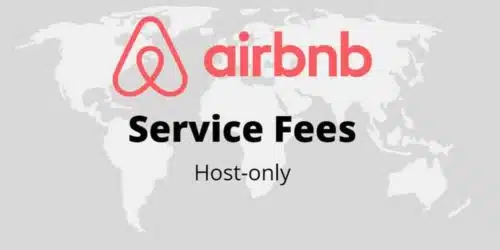To calculate Airbnb fees for hosts, you need to consider various components such as the host service fee, guest service fee, cleaning fee, and a few more. The post elaborated more on how to calculate Airbnb fees and detailed more on how hosts should be aware of any local regulations that might affect their fees.
Airbnb Fees For Host
The Airbnb fees refer to the various charges and costs associated with using the Airbnb platform as either a host or a guest. Airbnb, as a booking platform, facilitates the process of renting accommodations, experiences, and other services from hosts to guests. Both hosts and guests incur fees during the booking process, and these fees help Airbnb maintain and operate its services.
Airbnb fees for hosts consist of different elements that impact their earnings from hosting guests.
#1. Host Service Fee
Airbnb charges hosts a percentage-based service fee on each booking they receive. This fee is deducted from the booking subtotal before the host receives their payout. The percentage for this fee can vary based on several factors. Including the reservation subtotal, listing location, and other considerations. In some cases, the host service fee may be around 3% to 5% of the booking subtotal.
#2. Cleaning Fee
Hosts can set a cleaning fee to cover the cost of cleaning their listing between guests. This fee is added to the guest’s booking total, and the host receives the full amount of the cleaning fee. The cleaning fee can vary depending on the size of the property, the level of service provided, and other factors.
#3. Additional Host Fees
Depending on your location and specific circumstances, there may be other fees like local taxes, VAT, or other regulatory fees that apply to your hosting income. These fees may be required by local authorities and may vary depending on the jurisdiction.
#4. Occupancy Taxes
In certain locations, hosts may be required to collect and remit occupancy taxes to local authorities. These taxes vary depending on the region and may be added to the guest’s total payment.
#5. Currency Exchange Fees
If the host’s payout currency is different from the guest’s payment currency, Airbnb may apply currency conversion fees.
#6. Resolution Center Fees
In case of disputes or damages, Airbnb may charge fees for processing claims through its Resolution Center.
#7. Optional Services Fees
Airbnb offers additional services that hosts can choose to use. Such as professional photography, promotion tools, or enhanced support. These services often come with separate fees, which the host can decide to opt in or opt out of.
#8. Guest Service Fee
Guests pay a fee that is calculated as a percentage of the total booking cost, which goes to Airbnb for their services.
Benefits of Airbnb Host Fees
Airbnb host fees offer several benefits to hosts who use the platform to list and rent their accommodations. These fees contribute to the overall functioning and success of the Airbnb ecosystem while providing hosts with valuable services and support.
Some benefits of Airbnb host fees include:
#1. Platform and Exposure
By paying host fees, hosts gain access to Airbnb’s vast global marketplace, where millions of travelers actively search for accommodations. This exposure helps hosts reach a broader audience and attract potential guests from around the world.
#2. Marketing and Promotion
Airbnb invests in marketing and promoting its platform, which indirectly benefits hosts by increasing the visibility of their listings. This marketing effort can lead to higher booking rates and occupancy for hosts.
#3. Reservation and Booking Management
Airbnb provides hosts with a user-friendly interface for managing reservations, calendars, and communication with guests. This streamlined process simplifies booking management and reduces administrative burdens for hosts.
#4. Secure Payment Processing
Airbnb handles the payment processing between guests and hosts, ensuring secure and reliable transactions. This minimizes the risk of fraudulent activities and payment issues for hosts.
#5. Review System
Airbnb’s review system allows guests to leave feedback and ratings after their stay. Positive reviews can improve a host’s reputation, leading to more bookings and better visibility in search results.
#6. Host Protection Insurance
Airbnb offers a Host Guarantee and Host Protection Insurance in some regions, which provides coverage for property damage and liability. While not a replacement for homeowners’ or renters’ insurance, it provides an additional layer of protection for hosts.
#7. 24/7 Customer Support
Hosts have access to Airbnb’s customer support team, available 24/7, to help resolve issues, answer questions, and assist whenever needed.
#8. Community and Resources
Airbnb fosters a host community where hosts can share knowledge, experiences, and tips. Airbnb provides resources and educational materials to help hosts improve their hosting skills and enhance guest experiences.
While Airbnb fees offer various benefits to hosts, they also come with certain disadvantages that hosts should consider when using the platform.
Drawbacks of Airbnb Fees
Some of the disadvantages of Airbnb fees for hosts include:
#1. Reduced Profit Margins
Airbnb fees, such as the host service fee and guest service fee, can significantly reduce a host’s earnings from each booking. Depending on the booking value and fee structure, hosts may receive a smaller portion of the total booking amount.
#2. Additional Cleaning Fee Impact
While hosts have the option to set a cleaning fee, some guests may be discouraged from booking a listing with high cleaning fees. This could limit the number of potential guests willing to stay, affecting occupancy rates.
#3. Occupancy Taxes
If applicable, collecting and remitting occupancy taxes can be an administrative burden for hosts. Navigating local tax regulations and ensuring compliance may require additional time and effort.
#4. Increased Competition
As Airbnb becomes more popular, the number of listings in many areas continues to grow, leading to increased competition among hosts. This can make it challenging for some hosts to attract bookings and maintain steady occupancy.
#5. Cancellation Policies
While Airbnb allows hosts to set their cancellation policies, some hosts may experience cancellations from guests. These cancellations can disrupt a host’s revenue stream and may result in potential losses, especially if last-minute bookings are challenging to secure.
#6. Guest Misconduct or Property Damage
Although Airbnb offers Host Protection Insurance in some regions, it may not cover all instances of guest misconduct or property damage. Hosts may face unexpected expenses or disputes if damage exceeds coverage limits or falls outside the policy’s scope.
#7. Review System Impact
Negative reviews from guests can affect a host’s reputation and visibility on the platform, potentially leading to fewer bookings in the future.
#8. Data Privacy and Security Concerns
Hosting on a third-party platform like Airbnb means entrusting guest data to the platform’s systems, raising concerns about data privacy and security.
What Percentage Does Airbnb Take From Hosts?
Airbnb charges hosts a service fee that ranges from 3% to 5% of the booking subtotal. The booking subtotal is the total amount that a guest pays for the reservation before any taxes or fees.
Who Pays The Airbnb Host Fee?
The Airbnb service fee for hosts is paid by the host themselves. This fee is usually a flat rate of 3% of the booking subtotal, which includes the nightly price plus any optional fees they charge guests. In some cases, hosts may be charged a higher percentage if they have a special relationship with Airbnb. Or if they use certain features of the platform.
What Is The Hosting Fee?
A host fee on Airbnb is a fee paid by a host to list their property on Airbnb’s platform. The fee is usually based on the booking subtotal. Which includes the nightly rate, cleaning fee, and any additional guest fees charged by the host. The host fee is a rate of 3% of the booking subtotal and is automatically deducted from the host’s payout. However, there are different fee structures, such as the Host-Only Fee structure. The website deducts the total service fee from the host’s payout and does not charge a service fee to guests.
How Often Does Airbnb Pay Hosts?
The frequency of Airbnb payouts to hosts depends on the length of the guest’s stay. In most cases, Airbnb sends payouts to hosts about 24 hours after the guest checks into their place. For guests who stay longer than 28 nights, hosts will receive payment monthly. Additionally, hosts receive their payment 1-2 days after the guest checks in. The payout method determines how long it takes for hosts to receive their money.
How To Calculate Airbnb Cost?
The cost of an Airbnb rental can be calculated by adding the nightly rate charged by the host, any cleaning fees, and any additional guest fees charged by the host. The total of these fees, known as the booking subtotal, is then used to calculate taxes and Airbnb service fees, which are charged to the guest. Hosts are paid a percentage of the booking subtotal, minus Airbnb’s service fee, as their payout. There are also various Airbnb calculators available online that can estimate the potential revenue and earnings from an Airbnb rental, based on factors such as the location, property type, and number of guests.
How Do Airbnb Hosts Get Paid?
Airbnb hosts can choose from several payout methods to receive payment for their hosting services. These payout methods include Fast Pay, bank transfers, PayPal, and Payoneer debit. The exact time when a host receives payment may vary depending on the method they choose and the length of the guest’s stay. For example, hosts typically receive payment 1-2 days after the guest checks in, while hosts of monthly stays receive their payout monthly. Airbnb will send the payout to the host’s selected payment method, minus the service fee Airbnb charges for using their platform.
How Quickly Does Airbnb Pay?
Airbnb sends payouts to hosts about 24 hours after the guest checks into their place. If the guest is staying for 28+ nights, the host will receive their payout monthly. However, the specific payout method the host has chosen can determine when they receive their payout from Airbnb.
Is Airbnb Profitable For Hosts?
Airbnb can be profitable for hosts if they figure out the right way to do it. The amount of profit a host can make depends on various factors. Such as location, pricing strategy, availability, and the state of the local real estate market. Some hosts have reported earning significant income from their Airbnb rentals, with monthly earnings ranging from a few hundred dollars to over $12,000. Hosts need to take into account all expenses, such as cleaning fees, maintenance costs, and taxes when calculating their potential profits. Airbnb’s profitability can vary widely. It can be a viable source of income for hosts who are willing to put in the work and make smart financial decisions.
Is It Worth It To Start An Airbnb?
The decision to start an Airbnb largely depends on several factors such as your location, property type, pricing strategy, and availability among others. Airbnb can be a financially lucrative investment for hosts who put in the effort and make smart decisions. And are also willing to deal with the potential downsides of hosting. Hosting on Airbnb can also be a full-time job, with issues such as property maintenance and dealing with needy guests. Hosts should consider all the pros and cons carefully before making the decision.
How Hard Is It To Run An Airbnb?
Running an Airbnb can be challenging and requires dedication and effort. Hosting an Airbnb property involves a lot of hard work, preparation, and ongoing management. Which includes property maintenance, ensuring guest satisfaction, and keeping up with local regulations. Hosts must also be prepared for potential risks and challenges. Such as dealing with difficult guests, unexpected property damage, and legal issues. However, with careful planning and good organizational skills, hosting on Airbnb can be a rewarding and profitable experience.
How Do I Make My Airbnb Successful?
Here are some tips that can help make your Airbnb successful:
- Treat it like a business and ensure that you are allowed to rent the property.
- Create a unique and positive experience for your guests.
- Be extremely responsive to guests.
- Make a good first impression with attractive photos and descriptions.
- Focus on providing unique experiences, not just a place to stay.
- Decorate your space thoughtfully and invitingly, while being attentive to detail and maintenance.
- Embrace a theme to give your space personality, without going overboard.
- Create extra incentives and fees for additional guests and services.
- Ensure an easy and convenient check-in process for guests, such as by installing a keyless lock.
- Prioritize getting good reviews, which leads to more bookings.
Conclusion
An Airbnb can be profitable, but it depends on various factors such as location, property type, pricing strategy, occupancy rates, competition, and operating expenses. Hosts who effectively manage their listings, offer desirable accommodations, provide excellent guest experiences, and price their rentals competitively are more likely to achieve profitability.
The advantage of Airbnb host fees includes access to a global marketplace, marketing and promotion, streamlined reservation management, and secure payment processing. Hosts can leverage these benefits to increase visibility, attract more bookings, and enjoy a user-friendly platform for managing their listings and payments. The disadvantages of Airbnb host fees include reduced profit margins due to the fees deducted from each booking. The potential guest is resistant to high cleaning fees, among others.






